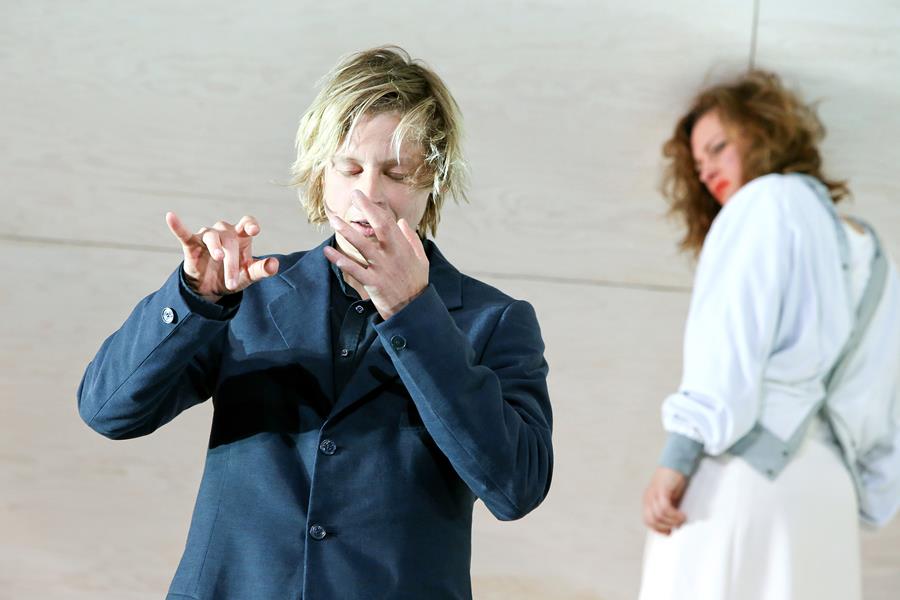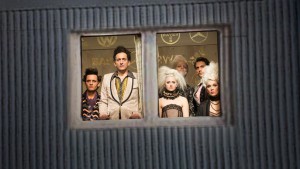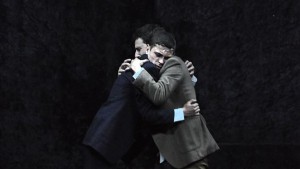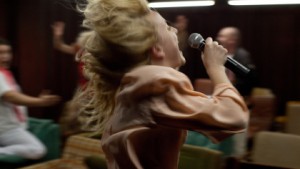Hiob. Longing and belonging

In 1916, Joseph Roth decided to interrupt his studies to join the Imperial Habsburg Army on the Eastern Front. For his future career as a writer, taking part in the greatest and bloodiest conflict of the modern age would not only mean bearing witness to a humanity waging a war, but also to the war exploding within human beings. The Austrian-Jewish writer once said, “Es kommt nicht auf die Wirklichkeit an, sondern auf die innere Wahrheit” (What counts is not reality, but the inner truth). It is possible to look at Roth’s whole journey into life as an expression of such a radical point of view that in most of his writing actual and fictional facts are indissolubly blended.
The powerful lecture entitled “Can a person be saved?” held by Koen Tachelet — author of the stage adaptation of Roth’s 1930 novel Hiob — addressed some of these questions, giving shape to the writer’s ability to describe the desolation of a tormented soul. “Ten kilometres from the bullets”, Tachelet said, “Roth wanted to experience the intensity, to immerse himself in the events”, grasping “atrocious moments of terrible beauty”. Hiob (Job) — whose title comes from the biblical character who is deprived of everything good and joyful as God puts his faith to the test — is nevertheless the story of an exile, both physical and moral. Mendel Singer is a “simple man”, a God-fearing orthodox Jew that teaches the Bible to twelve pupils in a small village in Tsarist Russia. The birth of Menuchim, his fourth son, who is afflicted with epilepsy and apparently incapable to communicate, will become the symbol of a relentless decadence. On the eve of the war, the whole family moves to New York, leaving Menuchim behind. Mendel’s faith is challenged by a sequence of adversities, but is eventually rewarded by the unexpected return of a grown up Menuchim, who has become a famous composer.
As Tachelet pointed out, the cornerstone of the adaptation and of Lisa Nielebock’s staging alike is the idea that leaving your country, or life, or family behind equates to losing your identity. With his wife, Deborah, dying, his daughter, Mirjam, going crazy, Mendel is no longer able to locate his own essence as a human being. This reflection immediately relates to the current refugee flow into Europe, “Today”, Tachelet argues, “there is no Promised Land, these people are moving to other places because they already lost their own. They are human beings in a permanent state of limbo, whose security seems only possible through separation, segregation, isolation”. That’s how our fears get frozen into a sort of moral paralysis. And that’s what happens with Mendel/Job once he realizes that he must shoulder the blame for the collapse of his family and its dreams.
The seven actors always remain on stage, trapped in the set designed by Oliver Helf that is an angular wooden box with no exit route; when Deborah dies, she quietly sits stage left. The characters’ journey on the “road to ruin” is thus visible from beginning to end: the group crosses the stage similarly to the oscillatory movements of the undertow in a sort of never-ending exile. Michael Schütz gives shape to a brilliant and powerful Mendel, embodying the tragic essence of the character without renouncing irony; and Jana Schulz transforms Menuchim into an ambiguous creature half between the ghost of Mendel’s past and a guardian angel of his future. In the very moment Mendel decides to leave Russia for America, he starts longing for the “inner motherland” where he belongs; there is no Promised Land because there is no present: the past has been dug under the expectation of a future. And Mendel is trapped between longing and belonging. The paradoxical happy ending devised by Roth, in which Mendel recognizes his lost son through the presage of “Menuchim’s Song”, is well rendered by Nielebock through the opening of the box on a line of blinding spotlights. Menuchim’s muteness dissolves into the simple and adamant speech of a lost child who wins back his family; and the serene atmosphere (all the characters wearing a quiet smile) suggests the interpretation that the whole ending might be a sort of ultimate dream, a Chekhovian farewell to the living. Abandoning reality in search of the inner truth.
Hiob | Job Based on the novel by Joseph Roth Adapted for the stage by Koen Tachelet
Director | Lisa Nielebock Stage Designer | Oliver Helf Costume Designer | Ute Lindenberg Music | Thomas Osterhoff Light Designer | Andreas Bartsch Dramaturgy | Kekke Schmidt
Opened on 6 September 2015 Kammerspiele, Schauspielhaus Bochum, Germany Cast | Mendel Singer – Michael Schütz, Deborah – Irene Kugler, Menuchim – Jana Schulz, Mirjam – Xenia Snagowski, Schemarjah / Groschel – Florian Lange, Jonas / Kosak / Mac / Skowronnek – Damir Avdic, Doktor / Kapturak / Bauer / Psychiater / Menkes – Klaus Weiss The performance was shown with English surtitles in context of the General Assembly of the UTE at the Schauspielhaus Bochum, on 8 April 2016. Published on 11 April 2016 (Article originally written in Italian)




